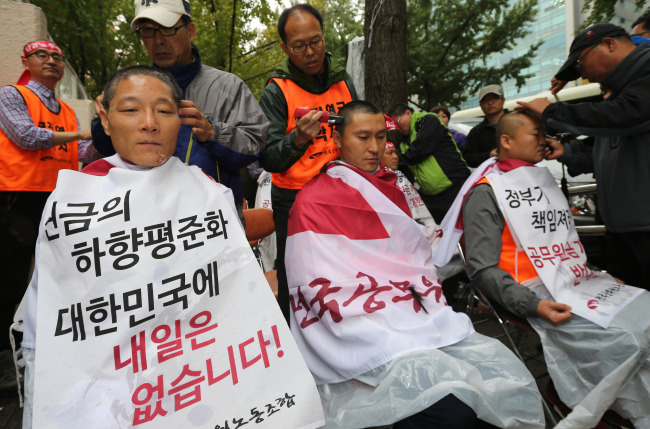Public servants who have not already worked for a long time would be most disadvantaged by the government’s latest proposal to cut the monthly pension for public workers by more than 30 percent.
The Ministry of Security and Public Administration on Saturday officially submitted to the ruling Saenuri Party its latest proposal to reform public servants’ pensions.
According to the proposal, which has been fiercely opposed by unionized public workers since earlier this year, all public employees will have to pay 43 percent more in premiums and receive 34 percent less in pension payouts, starting in 2016.
The civil service pension fund has been in the red since 1999, and some 3.5 trillion won ($3.3 billion) will be needed to cover the shortfalls in 2016 if the current imbalance continues, according to the National Assembly Budget Office.
“Some 4.2 trillion won would be saved by the end of the current administration’s term, and 22.1 trillion won will be saved by 2027 upon the implementation of this reform,” the Public Administration Ministry said in a statement.
 |
Unionized public servants shave their heads in protest against the government’s pension reform proposal in front of the government building in central Seoul on Monday. (Yonhap) |
The proposal, however, is much in favor of public employees who have worked for more than 15 years, raising concerns about the objectivity of the already controversial reform plan.
For example, those who were hired in 1996 will see a slight decrease in monthly payouts from 2.22 million won to 2.1 million won, but public servants first employed in 2006 will have to swallow a far greater cut in payouts from 2.01 million won to 1.5 million won.
Under the proposal, public servants who start their careers in 2016 will have to live with far smaller payouts ― 960,000 won per month.
Ever since the ruling Saenuri Party jointly announced its initial reform plan earlier this year, along with the Korean Pension Association, the proposal triggered intense resistance from the nation’s unionized public workers.
The unionized workers argue that the party’s plan will mainly benefit members of the KPA, many of whom are associated with private insurance firms, including Hanwha Life Insurance and Samsung Fire & Marine Insurance.
On Monday, some 300 unionized public servants participated in a rally in front of the government building in central Seoul, with some members shaving their heads in protest against the reform plan.
“Many scholars and pension experts have said the proposal has many flaws,” said Lee Chung-jae, a representative of a public workers’ union, in a statement. “We cannot accept the proposal, and if needed, we will demand the current administration to step down.”
Meanwhile, Rep. Cho Won-jin of the Saenuri Party last week revealed that 1 in 5 retired public workers currently receives more than 3 million won in pension payouts, which is about nine times higher than what retired workers in private sectors get.
Last month, a forum on the pension reform, organized by the Saenuri Party and the KPA, was canceled as some 200 unionized public workers blocked the proceedings in a conference hall of the National Assembly.
According to a report submitted to Rep. Cho’s office by the Ministry of Security and Public Administration, a total of 338,450 retired public workers were receiving their pension payouts as of August.
Among them, 75,036 were paid more than 3 million won each month. The percentage of such recipients rose from 18.4 percent in 2102 to 22.2 percent this year.
In response to the government’s proposal, an increasing number of public servants have submitted applications for early retirement in hopes to receive civil pension payouts at the current rate, according to the Ministry of Public Administration.
As of September, 8,876 public servants, including police officers and those who work in the nation’s education sector, had submitted their applications since January, according to the ministry. The applicants already outnumber the total number of received applications last year, which was 7,086.
By Claire Lee (
dyc@heraldcorp.com)








